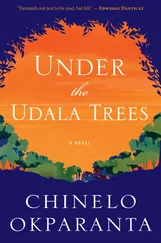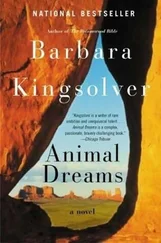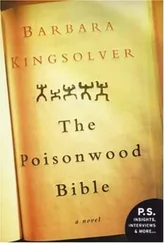After a while he said, “Throw a penny and make a wish.”
“That’s wasteful,” I said, kicking my toes in the water. “My mother always said a person that throws away money deserves to be poor. I’d rather be one of the undeserving poor.”
“Undeservedly,” he corrected me, smiling.
“One of the undeservedly poor.” Even my English was going to fall apart without him.
“Then we can wish on these.” He picked up one of the pop-top rings. “These are appropriate for American wishes.”
I made two American wishes on pop tops in Lake o’ the Cherokees. Only one of them had the remotest possibility of coming true.
At dusk we found picnic tables in a little pine forest near the water’s edge. Both Mattie and Irene had packed us fruit and sandwiches for the road, most of which were still in the Igloo cooler in the trunk. We threw an old canvas poncho over the table and spread out the pickle jars and bananas and apples and goose-liver sandwiches and everything else. Other picnickers here and there were working on modest little balanced meals of things that all went together, keeping the four food groups in mind, but we weren’t proud. Our party was in the mood for a banquet.
The sun was setting behind us but it lit up the clouds in the east, making one of those wraparound sunsets. Reflections of pink clouds floated across the surface of the lake. It looked like a corny painting. If I didn’t let my mind run too far ahead, I felt completely happy.
Turtle still had a good deal of energy, and was less interested in eating than in bouncing and jumping and running in circles around the trees. Every so often she found a pine cone, which she would bring back and give to me or to Esperanza. I tried very hard not to keep count of whose pile of pine cones was bigger. Turtle looked like a whirling dervish in overalls and a green-striped T-shirt. We hadn’t realized how cooped up she must have felt in the car, because she was so good. It’s funny how people don’t give that much thought to what kids want, as long as they’re being quiet.
It’s also interesting how it’s hard to be depressed around a three-year-old, if you’re paying attention. After a while, whatever you’re mooning about begins to seem like some elaborate adult invention.
Estevan asked us which we liked better, sunrise or sunset. We were all speaking in English now, because Esperanza had to get into practice. I couldn’t object to this-it was a matter of survival.
“Sun set, because sun rise comes too early,”
Esperanza said, and giggled. She was very self-conscious in English, and seemed to have a whole different personality.
I told them that I liked sunrise better. “Sunset always makes me feel a little sad.”
“Why?”
I peeled a banana and considered this. “I think because of the way I was raised. There was always so damn much work to do. At sunrise it always seems like you’ve got a good crack at getting everything done, but at sunset you know that you didn’t.”
Esperanza directed our attention to Turtle, who was hard at work burying Shirley Poppy in the soft dirt at the base of a pine tree. I had to laugh.
I went over and squatted beside her at the foot of the tree. “I’ve got to explain something to you, sweet pea. Some things grow into bushes or trees when you plant them, but other things don’t. Beans do, doll babies don’t.”
“Yes,” Turtle said, patting the mound of dirt. “Mama.”
It was the second time that day she had brought up a person named Mama. I registered this with something like an electric shock. It started in my hands and feet and moved in toward the gut.
I kneeled down and pulled Turtle into my lap. “Did you see your mama get buried like that?” I asked her.
“Yes.”
It was one of the many times in Turtle’s and my life together that I was to have no notion of what to do. I remembered Mattie saying how it was pointless to think you could protect a child from the world. If that had once been my intention, it should have been clear that with Turtle I’d never had a chance.
I held her in my arms and we rocked for a long time at the foot of the pine tree.
“I’m sorry,” I said. “It’s awful, awful sad when people die. You don’t ever get to see them again. You understand that she’s gone now, don’t you?”
Turtle said, “Try?” She poked my cheek with her finger.
“Yeah, I’m crying.” I leaned forward on my knees and pulled a handkerchief out of my back pocket.
“I know she must have loved you very much,” I said, “but she had to go away and leave you with other people. The way things turned out is that she left you with me.”
Out on the lake people in boats were quietly casting their lines into the shadows. I remembered fishing on my own as a kid, and even younger going out with Mama, probably not being much help. I had a very clear memory of throwing a handful of rocks in the water and watching the fish dart away. And screaming my heart out. I wanted them, and knew of no reason why I shouldn’t have them. When I was Turtle’s age I had never had anyone or anything important taken from me.
I still hadn’t. Maybe I hadn’t started out with a whole lot, but pretty nearly all of it was still with me.
After a while I told Turtle, “You already know there’s no such thing as promises. But I’ll try as hard as I can to stay with you.”
“Yes,” Turtle said. She wiggled off my lap and returned to her dirt pile. She patted a handful of pine needles onto the mound. “Grow beans,” she said.
“Do you want to leave your dolly here?” I asked.
“Yes.”
Later that night I asked Esperanza and Estevan if they would be willing to do one more thing with me. For me, really. I explained that it was a favor, a very big one, and then I explained what it was.
“You don’t have to say yes,” I said. “I know it involves some risk for you, and if you don’t feel like you can go through with it I’ll understand. Don’t answer now, because I want to be sure you’ve really thought about it. You can tell me in the morning.”
Esperanza and Estevan didn’t want to think about it. They told me, then and there, they wanted to do it.
Soundness of Mind and Freedom of Will
Mr. Jonas Wilford Armistead was a tall, white-haired man who seemed more comfortable with the notarizing part of his job than with the public. Even though he had been forewarned, when all of us came trooping into his office he seemed overwhelmed and showed a tendency to dither. He moved papers and pens and framed pictures from one side of his desk to the other and wouldn’t sit down until all of us could be seated, which unfortunately didn’t happen for quite a while because there weren’t enough chairs. Mr. Armistead sent his secretary, Mrs. Cleary, next door to borrow a chair from the real-estate office of Mr. Wenn.
Mr. Armistead wore a complicated hearing aid that had ear parts, and black-and-white wires and a little silver box that had to be placed for maximum effectiveness on exactly the right spot on his desk, which he seemed unable to find. If he ever did, I thought I might suggest to him that he mark this special zone with paint as they do on a basketball court.
The silver box had tiny controls along one side, and Mr. Armistead also fiddled with these almost constantly, apparently without much success. Mrs. Cleary seemed during their working coexistence to have adjusted her volume accordingly. Even when she was talking to us, she practically shouted. It had an intimidating effect, especially on Esperanza.
But we all managed small talk while we waited. Which was all the more admirable when you consider that not one word any of us was saying was true, so far as I know. Estevan was an astonishingly good liar, going into great detail about the Oklahoma town where he and his wife had been living, and the various jobs he’d had. I talked about my plans to move to Arizona to live with my sister and her little boy. I think we were all amazed by the things that were popping out of our heads like corn.
Читать дальше












